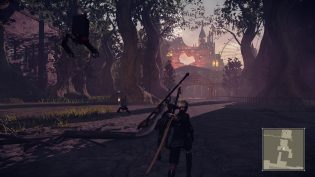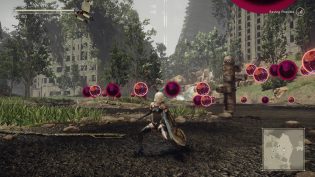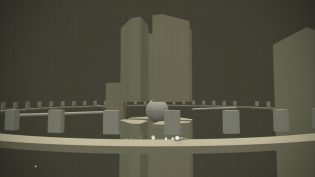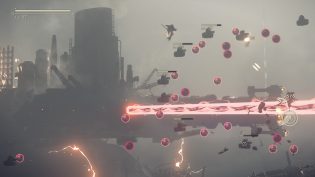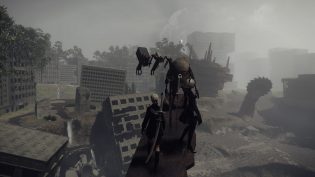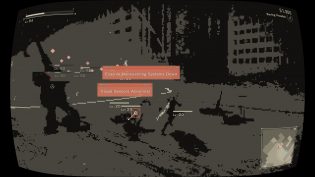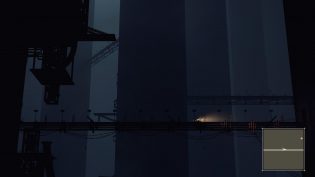I’ve been interested in Yoko Taro’s work for a while… despite not actually finishing any of his games until now. I gave Drakengard an honest try a while ago and the gameplay felt a bit too rubbish, so I didn’t get to experience the amazing concept of constantly updating story as you unlock more and more story paths after you finish the game once. I gave NieR an honest try, but didn’t have time or desire to finish it because, as a game, it felt pretty boring. So I didn’t get to experience the amazing concept of the story of the whole game being pretty much turned upside down on the second playthrough, just on the basis of you now understanding the opposite side of the conflict. But I read it all, watched it all. Because it felt like something not a lot of games try to do. A different approach to storytelling, lack of fear in exploring risky topics or “boring” the player.
So, without trying to downplay the work of Cavia or (for Drakengard 3) Access Games, I’m incredibly happy that PlatinumGames were selected to partner with Yoko Taro to work on NieR: Automata. I cannot think of a better choice of developer.
While the most obvious reason for why PlatinumGames is a good choice would be – great action mechanics, that’s not the only or, perhaps, not even the most important reason of why they were a perfect choice. In their previous games they often has shown how they can effectively and cheaply create extremely varied and constantly fresh scenarios for their games and aren’t afraid to innovate on top of their amazing systems. And that’s exactly what a game like this needed. If you don’t know about it already, NieR: Automata is only partially an action RPG title. It also, like the predecessor, has very strong focus on shmup/bullet hell segments and, on top of that, doesn’t even always try to keep everything in one kind of dimension, switching between free movement 3D camera, to side scrolling, to top down at various points. And one of the best things I can say about NieR: Automata and what PlatinumGames achieved is – seamlessness of all these strange seemingly disjointed elements into one, constantly flowing game that almost never stumbles even for a bit.
And it never stopped to amaze me how this pretty small condensed world kept on giving me surprises. There’s one connected game world, consisting of several thematically different areas – think of Zelda, LoK: Soul Reaver or Souls game, but on a slightly smaller scale. None of the areas are particularly big and you’re able to run from one end of one to another in probably less than 3 minutes. Which is exactly why it’s amazing how much events happen in these places you become so familiar with, so it never gets boring. Also, as with the previous game, you can ride (and drift, no joke) animals, but this time around it actually feels rarely needed as the base running speed of the character, as usual for Platinum, is pretty fast already.
But if you know anything about Yoko Taro’s games, you know that the real treat is in the new content that gets unlocked during replays of the game. And there’s some… pretty unexpected stuff happening this time around, I gotta say. Without trying to spoil more than what was already known, this time around the replayability makes most sense, since you get to play as 3 different characters and experience the same story from several different standpoints to get all sides of the same tale. Think of awesome ideas of Scenario A and B from Resident Evil 2 or Alone in the Dark: The New Nightmare, but with a few twists. Quite a few twists.
Moreover, I’d actually suggest anyone playing for the first time to outright skip all the sidequests, apart from some that are picked up along the way, as only on the second playthrough you’d get a chance to unlock a lot of content that is inaccessible first time around. Or, even, make a full 5 story ending run and later replay the game for all the side story content. Since, as with previous games, all sidequests are shared between playthroughs on the same savefile and the game seems actually designed to be experienced in a story-driven, no side-stepping, way first anyway.
But the story and most of the side-content is done really well, even if, to be completely honest, the main hook of the game is in the world and storytelling, themes it explores rather than the story itself. To the point where I actually felt slightly disappointed that this time around the story didn’t have any kick in the teeth moment, like previous NieR had, being just “very good for what it is”, rather than surprising. Which is as much criticism as much as it’s praise – it’s not often I can criticize the game for being “not as fantastic as I hoped it would be”. But NieR: Automata, I feel, is best described exactly like that. It has all the fantastic PlatinumGames mechanics, but they’re not often needed and are just there to make for an extremely fun to play action RPG, without usually feeling actually challenging, however. It has amazing world, explores incredibly interesting themes, it’s emotional to play, but at the same time rarely surprising or that fresh in it’s story. And while it’s constantly varied in how it tells the story, it never feels as crazy and adventurous as some of the previous Yoko Taro games were. It’s more better “produced”, without compromising the core ideas, but it feels like in removing some of the rough edges of previous games, some, a tiny little bit, of the charm was lost as well.
What was definitely not lost is the beauty of the soundtrack. This is that rare time again, when I absolutely need to mention how amazing and unforgettable the soundtrack of the game is. As with the first NieR, Keiichi Okabe created something unbelievable here. It’s a mix of orchestral and choral music that feels fresh, instead of being the usual “cinematic” boredom. The lyrics of the tracks mix several different languages, creating a new language that often lacks any intelligible lyrics, and instead conveys the emotions through the sounds and melody of the words, rather than the meaning.
Which is another way you can describe NieR: Automata. It’s a game that is definitely worth experiencing. You won’t get enlightened, but you will care.


